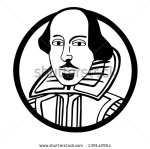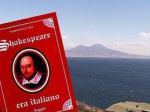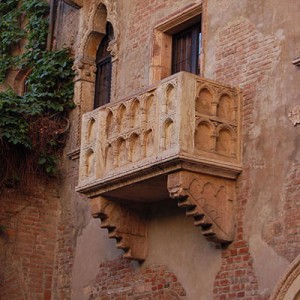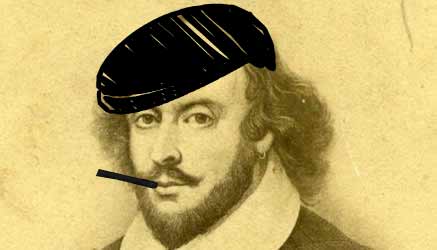William Shakespeare is the emblem of English literature for sure, but, you know, every time I read his works he seems so familiar to me, so Italian. This is not only because 15 out 37 of his works are set in Italy, he knows the nature of the Italians so well, that some of his immortal lines mirror perfectly some unchangeable traits of our society. An example? In his famous soliloquy “to be or not to be” , he actually seems to be pondering about committing suicide speculating on life and death, but he truly complains about some aspects of society that have the stamp of the Italian character. First of all ” the law’s delay” (it may take more than ten years to see the conclusion of a trial here and in the end you have spent so much money to pay the lawyers to end up destitute), “the proud man’s contumely“, the”insolence of office“, the”oppressor’s wrong” have been the causes of more than a suicide here especially in these times of economic crisis.
 However, there has been a lot of speculating about the authorship of Shakespeare. How could it be that a simpleton from Stratford-upon-Avon might display such learning ( likely grammar schools worked really well at those times) and intimate knowledge of Elizabethan and Jacobean courts? So the names of the candidates that for some reason must have hidden behind the pseudonym of Shakespeare are very celebrated indeed: Ben Johnson, Christopher Marlowe, the 17th Earl of Oxford and many others. My candidate is Michelangelo Florio Crollalanza.
However, there has been a lot of speculating about the authorship of Shakespeare. How could it be that a simpleton from Stratford-upon-Avon might display such learning ( likely grammar schools worked really well at those times) and intimate knowledge of Elizabethan and Jacobean courts? So the names of the candidates that for some reason must have hidden behind the pseudonym of Shakespeare are very celebrated indeed: Ben Johnson, Christopher Marlowe, the 17th Earl of Oxford and many others. My candidate is Michelangelo Florio Crollalanza.
 In his book Shakespeare era italiano (2002), Martino Juvara, a Sicilian Professor, claims that Michelangelo Florio Crollalanza was born in Messina (Sicily) on 23rd April 1564 (William Shakespeare ‘s same date), the son of Giovanni Florio, a doctor, and a noblewoman, Guglielmina Crollalanza. He was educated by Franciscan monks, who taught him Latin, Greek and history . At the age of 15 he and his family had to flee in order to escape the Holy Inquisition, as they were Calvinist. If we focus on the surname Crollalanza, we see that crolla/scrolla in English becomes “shake” and lanza/lancia “spear”; Shakespeare, in fact. A coincidence? Maybe.
In his book Shakespeare era italiano (2002), Martino Juvara, a Sicilian Professor, claims that Michelangelo Florio Crollalanza was born in Messina (Sicily) on 23rd April 1564 (William Shakespeare ‘s same date), the son of Giovanni Florio, a doctor, and a noblewoman, Guglielmina Crollalanza. He was educated by Franciscan monks, who taught him Latin, Greek and history . At the age of 15 he and his family had to flee in order to escape the Holy Inquisition, as they were Calvinist. If we focus on the surname Crollalanza, we see that crolla/scrolla in English becomes “shake” and lanza/lancia “spear”; Shakespeare, in fact. A coincidence? Maybe.
 Michelangelo and his family went to Treviso and lived in the palace of Otello, a Venetian nobleman, who had murdered his wife Desdemona few years before, as he was blinded by jealously. Once in Milan Michelangelo fell in love with a 16-year-old named Giulietta, a young countess who had been kidnapped by the Spanish Governor and had accused the same Michelangelo of the act, as he was against Calvinism. Her family members opposed the union, and Giulietta committed suicide. It’s only after Giulietta’s suicide that Michelangelo decides to leave for England. Giordano Bruno, a Dominican friar, philosopher, mathematician and poet, helped him as he had strong friendships with the Earls of Pembroke and Southampton under whose patronage, Michelangelo reached England in 1588. Once in Stratford he took the name of a cousin that had died prematurely: William.
Michelangelo and his family went to Treviso and lived in the palace of Otello, a Venetian nobleman, who had murdered his wife Desdemona few years before, as he was blinded by jealously. Once in Milan Michelangelo fell in love with a 16-year-old named Giulietta, a young countess who had been kidnapped by the Spanish Governor and had accused the same Michelangelo of the act, as he was against Calvinism. Her family members opposed the union, and Giulietta committed suicide. It’s only after Giulietta’s suicide that Michelangelo decides to leave for England. Giordano Bruno, a Dominican friar, philosopher, mathematician and poet, helped him as he had strong friendships with the Earls of Pembroke and Southampton under whose patronage, Michelangelo reached England in 1588. Once in Stratford he took the name of a cousin that had died prematurely: William.
At this point you may ask: what about the language? Prof. Juvara asserts that his first plays were actually translated and when he married his English wife, she translated his works. Furthemore, for the biographers of the time Shakespeare seemed to a have a strong foreign accent. One more curiosity. Among the plays Michelangelo Florio Crollalanza wrote in Sicilian there in one entitled “troppu trafficu pì nnenti“. Do you want it translated in English? “Much Ado about nothing” 😀


Hi teacher,
It would be really great if Shakespeare was Italian! It would be a pride for Italy to have a poet like him: his talent is unique and his works are known and translated all over the world. There are so many coincidences that at this point I think that Shakespeare was much more Italian than English!
I don’t think Shakespeare could be considered as an Italian person. If he knew so much about Italy, is because he studied Italian literature, the greatest of all time, and he could make an idea of the Italian society.
Then the fact that in to be or not to be he complainted about some aspects of Italian society may just be a simple coincidence, or maybe, it reflected the English society at his time.
I think that these coincidences are a lot, and for me, these coincidences are not only coincidences but there is a connection between them. So Shakespeare probably is italian.
I’m not sure about the origin of the famous Shakespeare. In my opinion he was very influenced by the Italian culture and landscape, which could explain why we find so many stories set in Italy or that recall that place
Reblogged this on lampmagician.
The possibilities of Prof. Juvera’s theory may be valid, but his English wife writing the translation? At a time when Lord Francis Pancetta and friends were modernizing the English language, markedly changing it from what was then used in the Geneva Bible compared to the King James version? As one reads Sonnet XXX (Italian for 30 in English) which everyone does every day, everyone is struck by the translator’s’ (one or more?) skill in word selection in references to courts, law, and indebtedness. It is astounding.
As an aside, who is our Lord Francis Pancetta of today, changing English before our very ears? I can’t take too much of it, and I can imagine only so much of how this particular posting will be written five hundred years from now.
This reminds me a bit about Buffalo Bill . . . there are two places competing for “ownership” of the man’s coprse. It’s current location (Lookout Mountain, Colorado, near Boulder) was once guarded with tanks and troops from the Colorado National Guard because it was feared Cody, Wyoming, would send people to steal the body.
I’ve read a number of claims (and vociferous rebuttals) about Shakespear’s identity and origin and nationality. But, really . . . does he look Italian?
. . . it would be nice if we stopped using historical individuals to bolster flawed tribal identities . . . I have half a mind to become famous (or infamous) just to see who would claim (or deny) my nationality based on the convoluted history of my ancestry.
Its, not it’s . . . I edited the sentence from “currently” to “current” and forgot to change the pronoun.
I am sorry, but I think you should really update the blog post and write about John Florio and not about Michelangelo Florio, that lived in London just a few years. All the best.
I’ll tell prof. Martino Juvara about it, as this was his speculation and not mine . As far as I am concerned the Bard is ….the Bard himself and I would place Juvara’s analysis in the fun fact file, that is all.